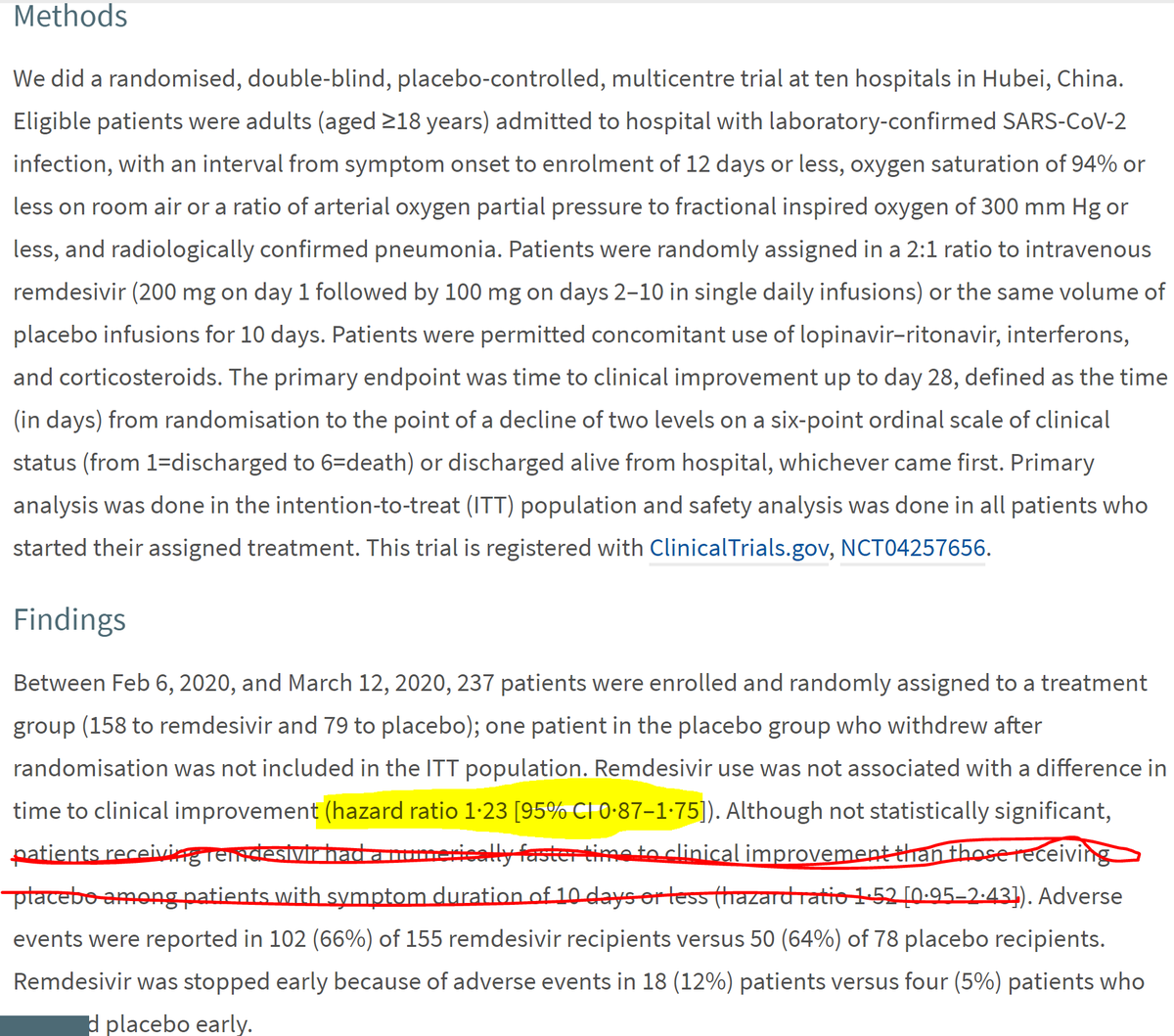Mortality trended towards benefit. In the context of a big reduction in time-to-get-better, I think we should give the mortality the benefit of the doubt.
"But Dr Francis, you were laughing at it before, so you just reversed your opinion?"
Yes. It's called thinking.
When Remdesivir, like many drugs, just had useless data, I carried on laughing. What it needed was proper clinical trials.
It has had two now. It works
1. Give me remdesivir.
and
2. Enrol me in an RCT of additional therapy too please, as there is a big chunk of death still to work on.
So I start with the prejudice that the methodology will be tip-top perfect.
And I trust people with skills of Antony Fauci: he doesn't accept any old rubbish data.
So let's have a look at her questions, which are very good.
This isn't that.
This isn't that.
This isn't that.
This is that.
(a) It wasn't randomized
(b) It wasn't blinded (with placebo control)
(c) Some other major lie
These have zero chance of occurring amongst established scientists reporting through the NIH
It is LESS than one bit per patient. (h/t Frank Harrell)
But my enthusiasm for the drug is from the primary.
(a) people decided on it AFTER the data were available, or
(b) staff were unblinded, as they are in the pointless other remdesivir trials I was mocking.
But blinded, and prespecified, so kosher in my view.
This is where my prejudice plays its role. Whenever anyone with at least half a brain plans an endpoint of "time to get better", they would build into it a method of ensuring that people who die count very badly.
Or one of many cleverer methods that I don't know about.
My prejudice is that this trial was not cooked by one random dude like me but by a group of highly professional scientists who would have build this in.
And the result is heavily swung one way by the issue you raise.
The arms will not be identical in characteristics, but the statistics can reliably estimate the degree of wobble away from perfect balance.
One arm will always be sicker than the other. It is inevitable. However the extent to which that is the case is predictable, and that is the magic of randomization.
Steven Senn wrote an article about it that @drjohnm linked to recently.
1. Needs to be in hospital
2. Needs Oxygen or has sats below some threshold
Trouble is, if you go in to hospital with breathlessness, you will get Oxygen. So you are severe!
I know you are surprised that I can be excited about the small relative and absolute risk reduction from statins, and remdesivir's effects which do not show significant survival advantage.
And unexcited about so much else.
Not when the point estimate of an effect is large."
D Francis
J Meta-statistical Musings 2020
Suppose I do an RCT of 2 people. One gets Francovir, the other gets placebo.
The Francovir patient lives, the other one dies.
That is to say, with no other information, no background on the nature of the disease or of the patient, or of how easy it is to treat the disease (it might be as simple as dehydration, curable by any fluid)
When you randomize just two patients, the two groups are as different as they can be.
One could be a 21 year old gymnast, who received 1 nanomol of intravenous chlorox
And the other a 108 year old diabetic with coronary artery disease who got placebo.
That's why we do lots of patients, so that a whole range of illness and wellness, amounts of viral load, and disease severity, go into each group.
It so happens that it does very roughly balance the arms for each variable, but that is not WHY we do it, I have realised recently, in this article by Stephen Senn. h/t @drjohnm
errorstatistics.com/2020/04/20/s-s…
This allows us to draw the error bar.
With a very small study, the point estimate is almost always wildly big (good or bad!) but the error bar immediately tells you that it is meaningless.
I just ignored it.
It was a good thing it was unblinded. Saved a bit of money.
Could have saved more money by not doing it at all.
There was no way to know because there was no randomized control group.
That is why the "compassionate use" terminology is pretty stupid here.
Not because it kills the patient (although it might, if it was Francis Industries' iv Laser-Chlorox)
But because it kills everyone else who gets the disease afterwards, due to
(a) lack of good data, and worse
(b) adding of stupid data
This is where reputation and track record matters: it affects what I assume when something is not stated.
I would reply "Because she is an expert in surgery, working in a proper hospital surrounded by many professionals who would have freaked out if not"
The reason I am letting it pass is that
1. I can understand what statistical method they would use for their NEW endpoint, but I sure as hell don't understand fully what they would have done for the OLD (seems rather complicated).
That is the nature of scientific reputation. It is based on decades of professionalism, which they have demonstrated repeatedly.
But I (currently) believe this trial and its interpretation were controlled by proper independent clinical researchers with high standards.
1. Keep social distancing
2. Get remdesivir. It kills the virus a bit and will probably slightly reduce your chance of dying
3. Get randomized into further trials, so that you can help your loved ones to not die, rather than allow yourself to contribute to fake news





























